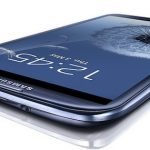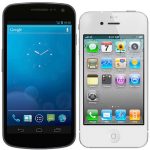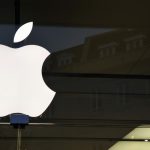Would US consumers choose iPad mini over Kindle Fire?

Rarely does a ChangeWave consumer buying survey offer so many intriguing topic possibilities. Interest in Kindle Fire has collapsed, only 7 percent of respondents plan to purchase a new tablet within 90 days, those buying overwhelmingly choose iPad, but interest in a smaller Apple tablet is fairly modest.
Buying intention surveys are often misleading. What people would like to do often isn't what they will when time comes to pay up. With that caveat, the survey -- 2,893 consumers last month -- bodes ill for Kindle Fire or prospective iPad mini. In November, 22 percent of respondents said they would buy Kindle Fire, but only 8 percent in May. Meanwhile a mere 3 percent of respondents would very likely buy iPad mini.
Why aren't you reading this story on Samsung Galaxy S III?

If you live in parts of Europe, the Middle East or Asia, arguably the hottest smartphone on the planet is selling out fast, and, whoa, it's not iPhone 4S. May 29 dawned on the continent to a new day for Samsung smartphones and sunset for Apple's flagship, which is oh-so similar to the one released in early 2010. Buyers looking for freedom from the walled garden or simply stunning software innovation can choose to "think different", borrowing the long-discarded Apple marketing phrase.
Twenty-six days ago, I asked: "Is iPhone 4 obsolete?" Nearly 2,000 of you answered "Yes" -- that's 65 percent -- by saying you will buy Galaxy S III. Now remains the question: How many of you planning to buy, really will do so?
Is Apple right to ban Airfoil Speakers Touch?

If you want a gander at one of iOS 6's new features, just ask developer Rogue Amoeba. Apple unceremoniously pulled Airfoil Speakers Touch, which has been in the iOS App Store since 2009. In the past, the company has refused apps or pulled others that compete with Apple repeat functionality iOS offers. The ban hints at streaming capabilities coming in the next version, while raising questions about appropriateness or fairness. Hence the question to you: Is Apple right to ban Airfoil Speakers Touch?
"Today, we’ve been informed that Apple has removed Airfoil Speakers Touch from the iOS App Store", CEO Paul Kafasis says. "We first heard from Apple about this decision two days ago, and we’ve been discussing the pending removal with them since then. However, we still do not yet have a clear answer on why Apple has chosen to remove Airfoil Speakers Touch. Needless to say, we’re quite disappointed with their decision, and we’re working hard to once again make the application available for you, our users." Apple had already approved the removed version.
Seagate begins its next big takeover: LaCie

American storage company Seagate announced on Wednesday its intention to become majority owner of French storage company LaCie by buying 64.5% of the company's shares from chairman and CEO Phillippe Spruch. Pending government approval of this transaction, Seagate will then buy up the rest of the outstanding stock in cash or commence a squeeze out maneuver of any minority stakeholders.
After he sells his stake, Spruch will become the head of Seagate's consumer storage products organization, above Patrick Connolly, who is currently Seagate's vice president and general manager of retail. Deputy general manager of LaCie Pierre van der Elst will also join the Seagate team. The financial terms of the new position for LaCie's CEO have not yet been determined.
iPhone meets its match

Finally, initial sales of another smartphone smoke iPhone -- that is if leaked numbers prove true. Samsung Galaxy S III goes on sale in 11 days, but preorders reportedly already top 9 million. By comparison, the much-lauded iPhone 4S sold 4 million units, including preorders, during its first three days of availability. At this pace, Galaxy S III is poised to be the biggest smartphone launch to date.
Samsung announced the smartphone on May 3, when I asked: "Is iPhone 4S obsolete?" Surely someone thinks so, and their answer should chill the hearts of Apple apologists and investors. Samsung, not Apple, is the rising star in the cloud-connected device firmament. Perhaps iPhone 5 will change matters. But for now, Samsung, propelled by the Galaxy S brand, broad channel distribution and smart software innovation, is brightest star.
Samsung accounts for 40% of Android smartphone sales

The figure is so important, I'm breaking it out from the long analysis posted mid-afternoon about the smartphone market consolidating around Apple and Samsung. The South Korean electronics giant is doing to Android on smartphones what Amazon does on tablets: Hugely fragment the market around a forked operating system. I warned about this three weeks ago in post "Google has lost control of Android". Now there is sales data to back it up.
Earlier today, Gartner released first quarter sales data for global handsets. Not shipments into the channel, but actual sales to end users. Market leader Samsung accounted for 40 percent of all Android smartphone sales, with no other manufacturer topping 10 percent. Sure Samsung's success lifts overall Android smartphone share -- 56.1 percent up from 36.4 percent a year earlier. But what's good for Samsung isn't necessarily in the best interests of the broader Android ecosystem.
Smartphone market consolidates around Apple and Samsung

Today, Gartner put to end weeks of cellular handset debate. Apple apologists disputed Samsung's smartphone success over iPhone -- the presumption that the South Korean electronics giant benefits from greater shipments vs actual sales. Make no mistake: Samsung is the global leader overall and in the smartphone category, based on actual sales. Apologist arguments be damned.
That said, Apple's position is solid. Together, Apple and Samsung combined smartphone sales market share approaches 50 percent. Contrary to speculation that Windows Phone might appear as a third dominant mobile OS, the market is set to largely split between two vendors. As I explained three weeks ago in post, "Google has lost control of Android", Sasmung's rise isn't necessarily good for the broader ecosystem.
Frak, yeah, I'd use iPad if there was Google Chrome

What timing. I posted my iPad for sale on Craigslist over the weekend -- and two people are jockeying to get ahead of the other to buy it today. But I'm suddenly unsure about selling, after seeing a Macquarie Capital report claiming that Chrome will come to iOS as early as this quarter. Hot damn!
I rarely make decisions based on rumors, nor should you. Besides, the "timing is unclear, but it could be as soon as Q2 and is very likely to be a 2012 event", according to Macquarie Capital. "Could" be this quarter and "likely" this year stink of pure speculation -- or big back door should there be no Chrome for iOS this year. In the end, I'll likely sell the iPad, but must convey this: Chrome would be a very good reason to buy an iOS device but be akin to Google cutting off one limb to save another.
iCloud, iOS 6 and other Apple leaks are all about Facebook's IPO

Apple execs all follow the same party line: They don't talk about forthcoming products. But somebody often does, perhaps coordinated with public relations folks or even careful disclosure from someone on Apple's board. Whom isn't so much important as someone does. As I've observed for years, leaks' timings are fairly consistent -- either to lift the share price or steal some other company's thunderous announcement. I can't help but see both in several seemingly strategic leaks, starting with today's disclosure about iOS 6 features.
The Wall Street Journal reports that iCloud will get new photo- and video-sharing capabilities, which include comments and availability outside Photo Stream -- meaning people don't have to own a fruit-logo product to view them. Apple reportedly is extending photo capabilities, while adding video-sharing as feature set. Today's leak follows another -- this one from 9to5 Mac, claiming Apple will dump Google Maps for its own service in iOS 6. Both leaks communicate that Apple is serious about social cloud services and search, and I don't believe they're coincidentally timed, given Facebook's imminent IPO.
Apple is replacing Google maps in iOS 6? You don't say

The tech blogosphere is abuzz today following a report by Apple news site 9to5Mac claiming "trusted sources" say Google Maps will get the boot in iOS 6, replaced by an in-house solution. It is no secret these two companies have an increasingly strained relationship, and Apple's acquisitions point towards a future in maps.
In the newsroom this afternoon, we chalked this one up to "sourced conjecture": that is, while 9to5Mac may indeed have some kind of inside track to what Apple plans in the next version of iOS, it certainly doesn't take a brain surgeon to figure this one out. The writing's been on the wall on this one for three years, at least.
You can have iPhone 4S, I'll take Galaxy Nexus

During the last six months, I've had the privilege to use three exceptional smartphones: iPhone 4S and two Galaxy Nexus variants -- one LTE and the other HSPA+. You can't go wrong buying either Android or iOS handset, although Galaxy Nexus supports more carrier networks here in the United States. Differences that matter are more than hardware (such as size, appearance or battery life) or software (apps and operating systems). Taking Galaxy Nexus or iPhone 4S is much more. Either is a digital lifestyle choice that many buyers won't grok before paying their hard-earned cash.
I can't emphasize this aspect strongly enough. In the days before Android and iPhone, early smartphone buyers also made digital lifestyle choices, such as BlackBerry users and persistent email or Windows Mobile buyers wanting mobile Office. But today, with differentiated, connected cloud services, digital lifestyle matters more than ever, and both handsets offer similar yet drastically different experiences. You're not just buying a phone but a way of life.
Fire all the lawyers

Could it be true? Are the courts finally tired of the never-ending patent disputes in Silicon Valley? If the statements made by two judges over the past week are an indication, yes.
This frustration was on display Monday in a Seattle court room as Federal Judge James Robart accused both Microsoft and Motorola of "hubris" and "arrogance" in their ongoing patent dispute, and using the courts to gain the upper hand in licensing negotiations, according to GeekWire's Todd Bishop, who was on hand for the proceedings.
Kindle Fire sales are still hot

Wow, what a swirl of good-news/bad-news last week for the media tablets aimed at the ereader market. As it turns out, the roller-coaster ride continues this week.
comScore reported that the Kindle Fire from Amazon generated far more Internet activity in February than any other Android media tablet. Then a few days later, Microsoft dumped $300 million into a Barnes & Noble ebook venture, a move spurred in part by the success of the bookseller’s media tablet, the Nook Tablet.
The mobile web is dead

Today, comScore released startling data about the mobile web, which bodes poorly for the browser. In March, the web browser accounted for just 18.5 percent of time spent online among US smartphone users. Mobile apps accounted for the rest. Now we know why Safari for iOS capabilities advance so sparingly: Apple sees it as irrelevant. Stated differently: Safari is to mobile what Internet Explorer 6 was to the desktop 10 years ago. Apps matter more to both developers.
Qualifying that one country does not the whole world make, the US data nevertheless foreshadows future trends and illuminates the past, demonstrating the wisdom of Apple's 2008 turnabout. When iPhone launched in June 2007, cofounder Steve Jobs couldn't say enough about Safari as a key user benefit. But by early 2008, Jobs and company shifted emphasis to the App Store, which launched in July of that year. In essence, Apple bet against the web after foaming at the mouth about open standards. Apps better fit Apple's "our way or the highway" approach to end-to-end hardware, software and supporting services. Only Google can save the mobile web now.
Is iPhone 4S obsolete?

I repeatedly ask you questions in headlines, because I ask myself. This one is top of my mind following today's Samsung Galaxy S III announcement. My eyes bugger at the differences in size, features and most importantly benefits -- the majority of those coming from Samsung skinning Android 4 into seeming oblivion. It's hard to discern a way that Galaxy S3 isn't superior to iPhone 4S. If iOS 5 looked antiquated before, and it surely did, Samsung's TouchWiz-modified Ice Cream Sandwich makes it suddenly ancient.
But the question is bigger than hardware or software. Samsung isn't the world's No. 1 handset maker overall and in smartphones by lark. Apple is known for focusing on delivering benefits that matter, sometimes at the expense of hardware capabilities, and truly aspirational marketing. Galaxy S III evokes these qualities, with something more: real benefits without sacrificing hardware capabilities while using software to enrich the human experience. Then there's the aspirational marketing, as seen in the embedded video. Samsung does something Apple-like, only better.
© 1998-2025 BetaNews, Inc. All Rights Reserved. Privacy Policy - Cookie Policy.